Key takeaways:
- Clear communication, empathy, and active listening are vital for understanding stakeholder needs in event management.
- Flexibility and adaptability in response to unexpected challenges can turn potential disruptions into unique experiences.
- Implementing real-time feedback from guests enhances overall satisfaction and allows for immediate adjustments during events.
- Small gestures and attentiveness to details, such as personal assistance and dietary needs, can significantly impact guest experience and satisfaction.
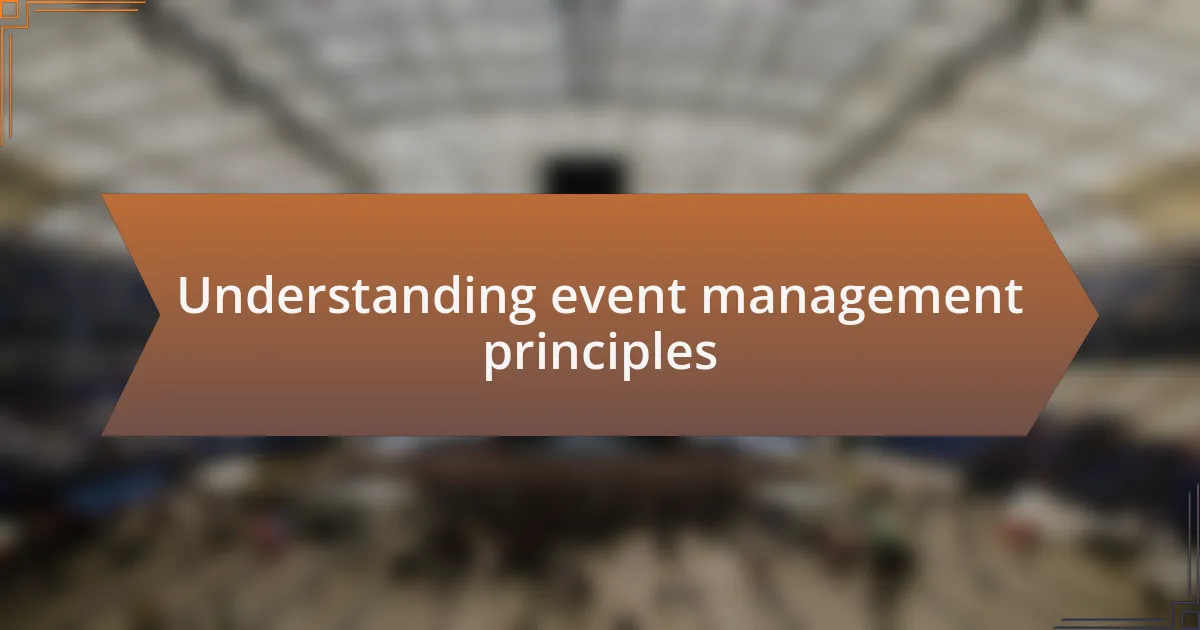
Understanding event management principles
Event management is rooted in a few fundamental principles that guide every successful gathering. I recall my early days in this field, where I realized that clear communication is more than just exchanging information; it’s about connecting with every stakeholder involved. I often wondered, how can my understanding of their needs enhance the outcome of the event? The answer often lay in empathy and active listening, which became my go-to strategies.
Budgeting is another essential principle that can’t be overlooked. I remember organizing a corporate retreat where I initially underestimated costs, thinking a tight budget could still allow for luxurious touches. It was a humbling lesson when I had to cut corners last minute, which led me to ask myself how I could better anticipate needs in future events. Now, I prioritize meticulous budgeting and use it as a roadmap, ensuring that every dollar spent aligns with the event’s vision.
Flexibility is also critical in event management. During one outdoor wedding I planned, unexpected rain changed everything. I had to shift gears quickly, deciding between an indoor backup or a tent rental. What I learned was that adaptability isn’t just about logistics; it’s a mindset that recognizes the unpredictable nature of events. How prepared are you to face unforeseen challenges? Embracing this fluidity not only alleviates stress but often leads to creative solutions that exceed guests’ expectations.
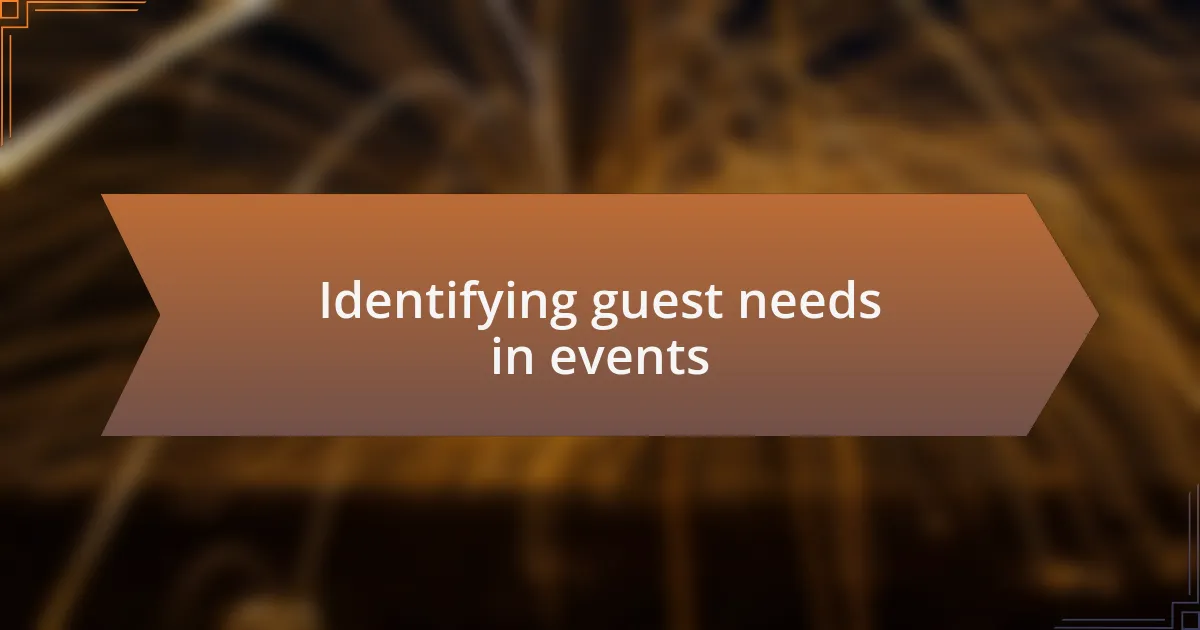
Identifying guest needs in events
When it comes to identifying guest needs in events, I always find that anticipation plays a crucial role. During a recent conference, I spent time mingling with attendees, asking open-ended questions about their expectations. The insights I gathered were invaluable; understanding that many guests sought networking opportunities over presentations helped me tailor the agenda to serve their desires more effectively.
Observing guest interactions can also reveal unspoken needs. For instance, while coordinating a charity gala, I noticed a group huddled in the corner, seemingly disengaged. By approaching them and inviting a conversation about their experience, I discovered they felt uneasy navigating the event. This prompted me to design a more inclusive atmosphere, such as introducing an event guide that eased navigation and engagement, ensuring that every guest felt welcomed and valued.
It’s essential to remember that guest needs can evolve throughout an event. I recall hosting a workshop where initial excitement shifted as attendees sought deeper, more meaningful discussions. Rather than sticking rigidly to the agenda, I embraced their cues, allowing the session to morph into a collaborative dialogue. This flexible approach not only met their immediate needs but also fostered a sense of community that kept everyone engaged. Isn’t it rewarding to create an environment where guests can express themselves authentically?
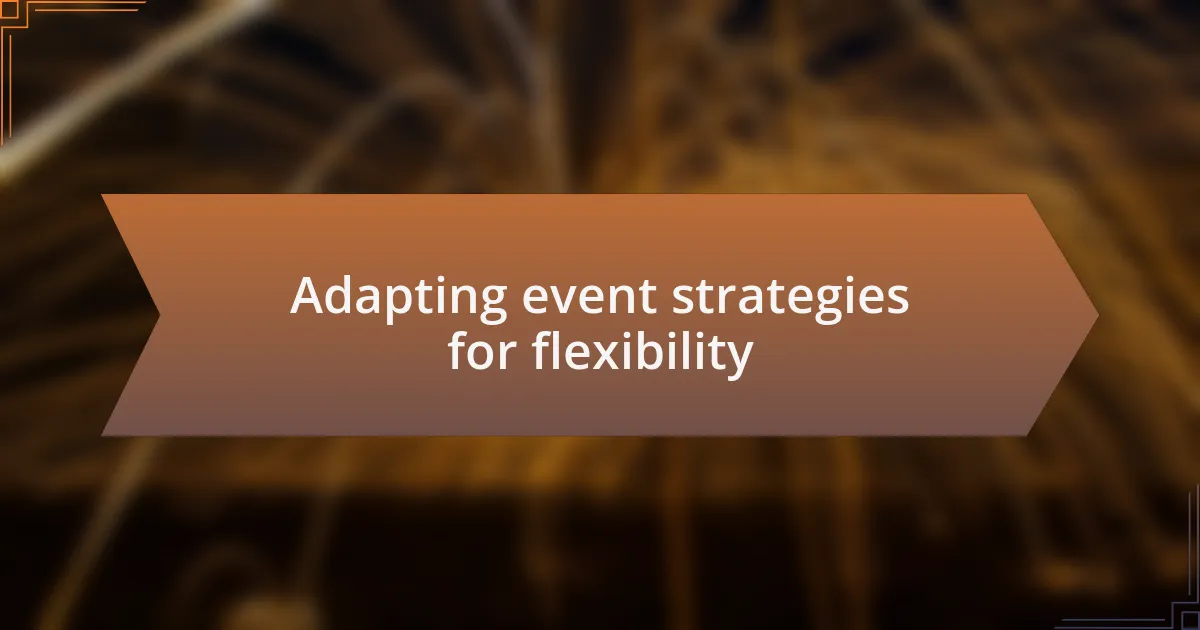
Adapting event strategies for flexibility
Adapting event strategies for flexibility is about recognizing when to pivot in response to guest feedback. During a recent outdoor festival, rain threatened to disrupt our plans. Instead of canceling, we quickly restructured activities to create more indoor spaces, transforming the event into an intimate experience. Watching the guests laugh and engage in cozy corners made me realize how adaptability can turn a potential disaster into a unique memory.
One key strategy I’ve adopted is maintaining open communication with my team during events. After noticing some guests looking overwhelmed in a bustling environment, I encouraged staff to engage directly with attendees, checking in to see if they needed anything. This simple action not only helped guests feel supported but also allowed us to gather real-time feedback, enabling us to make immediate adjustments. Isn’t it fascinating how a small shift in approach can greatly enhance the overall experience?
Flexibility also extends to understanding the unexpected dynamics that emerge during an event. I remember hosting a panel discussion where the audience’s enthusiasm shifted focus from the speakers to a heated debate about a recent industry trend. Instead of trying to redirect the conversation, I embraced it, inviting audience participation and facilitating a dynamic exchange. This moment of spontaneity not only enriched the event but also highlighted the importance of being responsive—most attendees left feeling energized and appreciated. How often do we recognize that the best moments in events often arise from unplanned interactions?
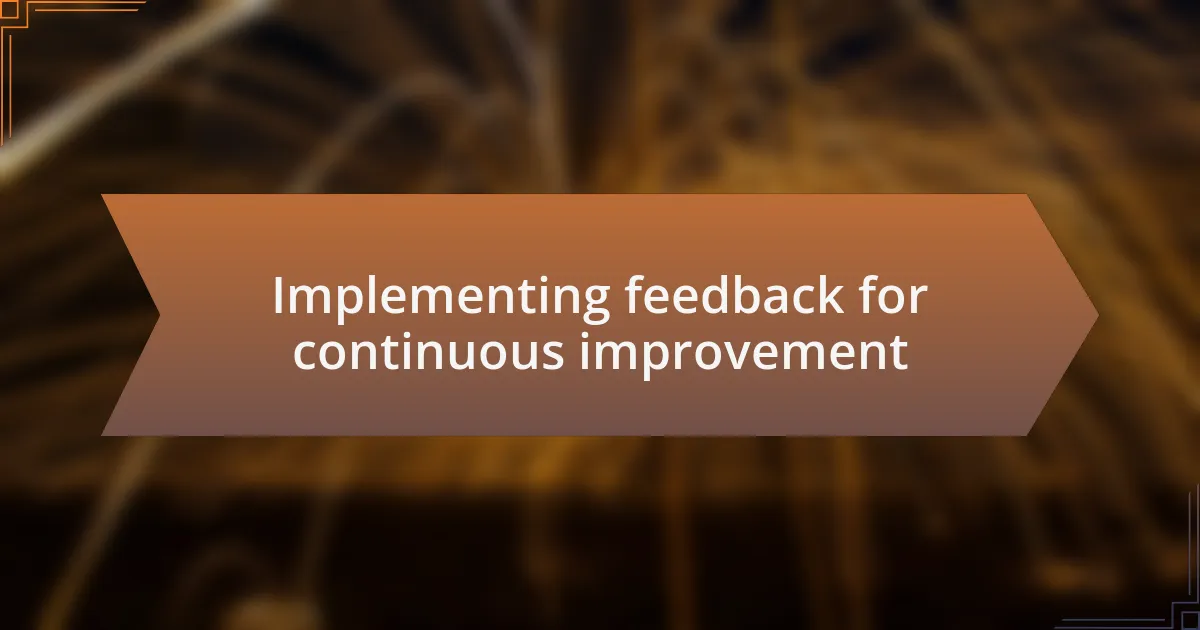
Implementing feedback for continuous improvement
Implementing feedback effectively is crucial for continuous improvement in event management. I remember a corporate gala where we distributed feedback forms to guests. When the data showed that many attendees felt the music was too loud, we took that insight seriously. For the next event, we adjusted the volume and even tailored playlists to match the atmosphere more closely. This small but significant tweak visibly enhanced guest comfort and enjoyment—it’s amazing how listening can transform the experience.
In another situation, I once encountered a glaring oversight: our seating arrangements at a networking event didn’t encourage mingling as intended. After hearing several attendees express their frustration, I quickly gathered my team to brainstorm solutions. We rearranged the seating mid-event, creating a more welcoming layout. Watching attendees flow into conversations and engage more fully after that was incredibly satisfying. Have you ever noticed how a simple change can shift the energy in the room?
Real-time feedback during events is a game-changer. I remember an interactive workshop where the initial activities didn’t resonate with participants. Rather than sticking to the agenda, I paused to ask for their input. This openness not only made guests feel valued but also allowed us to pivot and tailor the workshop on the fly. Seeing their enthusiasm grow as we adapted was a powerful reminder of how crucial it is to remain agile and responsive to the audience. What could be better than creating an event that feels custom-made for its attendees?
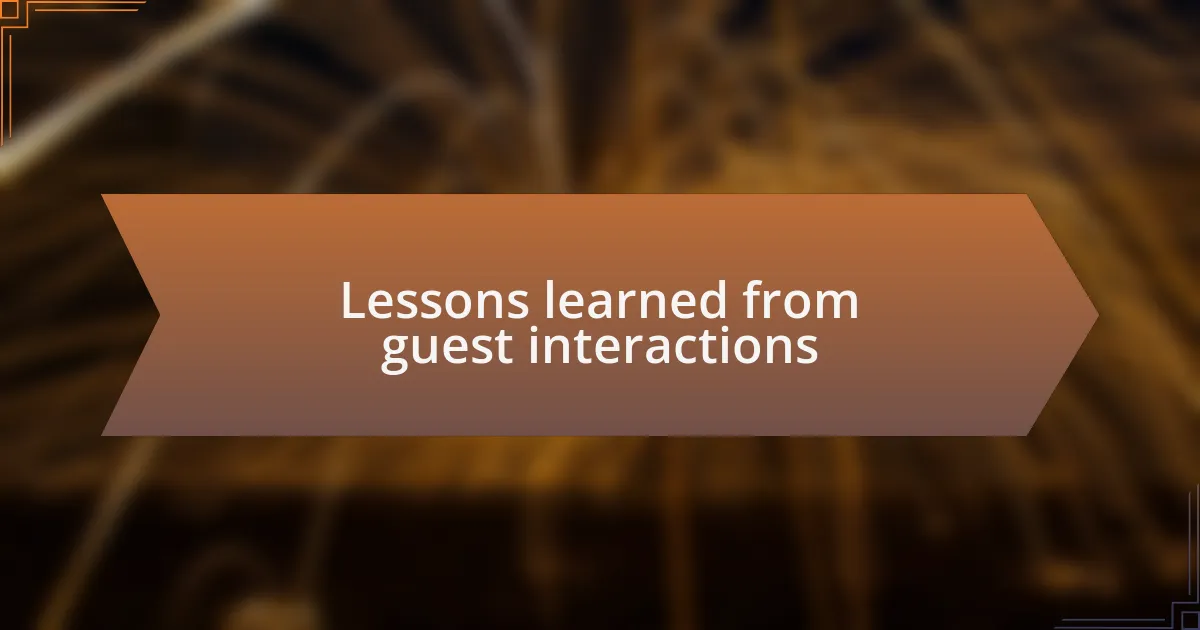
Lessons learned from guest interactions
One of the most enlightening lessons I’ve learned from guest interactions is the importance of small gestures. At a wedding I planned, I noticed that many guests were struggling to find their seats. Instead of letting this hiccup disrupt the flow, I had a few team members personally guide individuals to their tables. The relief on their faces was palpable. It made me realize that sometimes it’s the simple, personal touches that create a memorable experience. Have you ever thought about how a small act of kindness can leave a lasting impression?
Another key insight came during a community event where cultural diversity was a focal point. I had prepared a variety of food options, but there was a clear oversight regarding dietary restrictions. After a few guests expressed their disappointment, I quickly reached out to a local vendor who specialized in inclusive catering. Watching the faces of relieved guests as they finally had options was incredibly rewarding. It reinforced in me the importance of anticipating needs and adapting swiftly. How easy is it to overlook these details until they become a concern?
I also learned that attitude matters significantly in guest interactions. During a corporate retreat, a guest expressed dissatisfaction with the agenda. Instead of brushing off their comments, I engaged them in conversation to understand their concerns better. As we discussed their viewpoint, it became clear that they simply wanted more time for networking. I adjusted the schedule and witnessed the transformation in energy as connections formed. Have you ever experienced a moment where just listening shifted the entire atmosphere? This taught me that flexibility and a genuine eagerness to engage can completely change the dynamics of an event.